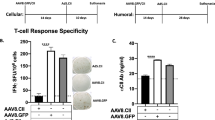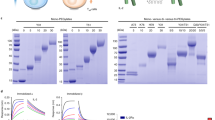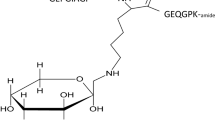Abstract
Although systemic administration of neutralizing anti-TNF antibodies has been used successfully in treating rheumatoid arthritis, there is a potential for side effects. We transduced a collagen reactive T-cell hybridoma with tissue-specific homing properties to assess therapeutic effects of local delivery to inflamed joints of anti-TNF single-chain antibodies (scFv) by adoptive cellular gene therapy. Cell culture medium conditioned with 1 × 106 scFv producer cells/ml had TNF neutralizing capacity in vitro equivalent to 50 ng/ml anti-TNF monoclonal antibody. Adding a kappa chain constant domain to the basic scFv (construct TN3-Cκ) gave increased in vitro stability and in vivo therapeutic effect. TN3-Cκ blocked development of collagen-induced arthritis in DBA/1LacJ mice for >60 days. Transgene expression was detected in the paws but not the spleen of treated animals for up to 55 days postinjection. No significant variations in cell proliferation or cytokine secretion were found in splenocytes or peripheral lymphocytes. IL-6 expression was blocked in the diseased paws of mice in the scFv treatment groups compared to controls. In conclusion, we have shown that local expression of an anti-inflammatory agent blocks disease development without causing demonstrable systemic immune function changes. This is encouraging for the potential development of safe adoptive cellular therapies to treat autoimmunity.
This is a preview of subscription content, access via your institution
Access options
Subscribe to this journal
Receive 12 print issues and online access
$259.00 per year
only $21.58 per issue
Buy this article
- Purchase on Springer Link
- Instant access to full article PDF
Prices may be subject to local taxes which are calculated during checkout







Similar content being viewed by others
References
O'Garra A . Cytokines induce the development of functionally heterogeneous T helper cell subsets. Immunity 1998; 8: 275–283.
Liblau RS, Singer SM, McDevitt HO . Th1 and Th2 CD4+ T cells in the pathogenesis of organ-specific autoimmune diseases. Immunol Today 1995; 16: 34–38.
Epstein WV . Expectation bias in rheumatoid arthritis clinical trials. The anti-CD4 monoclonal antibody experience. Arthritis Rheum 1996; 39: 1773–1780.
Feldmann M, Brennan FM, Maini RN . Role of cytokines in rheumatoid arthritis. Annu Rev Immunol 1996; 14: 397–440.
Feldmann M et al. TNF alpha is an effective therapeutic target for rheumatoid arthritis. Ann NY Acad Sci 1995; 766: 272–278.
Buchan G et al. Interleukin-1 and tumour necrosis factor mRNA expression in rheumatoid arthritis: prolonged production of IL-1 alpha. Clin Exp Immunol 1988; 73: 449–455.
Haworth C et al. Expression of granulocyte-macrophage colony-stimulating factor in rheumatoid arthritis: regulation by tumor necrosis factor-alpha. Eur J Immunol 1991; 21: 2575–2579.
Brennan FM et al. Inhibitory effect of TNF alpha antibodies on synovial cell interleukin-1 production in rheumatoid arthritis. Lancet 1989; 2: 244–247.
Malfait AM et al. Blockade of IL-12 during the induction of collagen-induced arthritis (CIA) markedly attenuates the severity of the arthritis. Clin Exp Immunol 1998; 111: 377–383.
Butler DM, Maini RN, Feldmann M, Brennan FM . Modulation of proinflammatory cytokine release in rheumatoid synovial membrane cell cultures. Comparison of monoclonal anti TNF-alpha antibody with the interleukin-1 receptor antagonist. Eur Cytokine Netw 1995; 6: 225–230.
Elliott MJ et al. Repeated therapy with monoclonal antibody to tumour necrosis factor alpha (cA2) in patients with rheumatoid arthritis. Lancet 1994; 344: 1125–1127.
Elliott MJ et al. Randomised double-blind comparison of chimeric monoclonal antibody to tumour necrosis factor alpha (cA2) versus placebo in rheumatoid arthritis. Lancet 1994; 344: 1105–1110.
Markham A, Lamb HM . Infliximab: a review of its use in the management of rheumatoid arthritis. Drugs 2000; 59: 1341–1359.
Chan AT, Cleeve V, Daymond TJ . Necrotising fasciitis in a patient receiving infliximab for rheumatoid arthritis. Postgrad Med J 2002; 78: 47–48.
Keane J et al. Tuberculosis associated with infliximab, a tumor necrosis factor alpha-neutralizing agent. N Engl J Med 2001; 345: 1098–1104.
Nunez Martinez O et al. Reactivation tuberculosis in a patient with anti-TNF-alpha treatment. Am J Gastroenterol 2001; 96: 1665–1666.
Ghivizzani SC et al. Direct adenovirus-mediated gene transfer of interleukin 1 and tumor necrosis factor alpha soluble receptors to rabbit knees with experimental arthritis has local and distal anti-arthritic effects. Proc Natl Acad Sci USA 1998; 95: 4613–4618.
Kim SH et al. Effective treatment of established murine collagen-induced arthritis by systemic administration of dendritic cells genetically modified to express IL-4. J Immunol 2001; 166: 3499–3505.
Seroogy CM, Fathman CG . The application of gene therapy in autoimmune diseases. Gene Therapy 2000; 7: 9–13.
Tsokos GC, Nepom GT . Gene therapy in the treatment of autoimmune diseases. J Clin Invest 2000; 106: 181–183.
Nakajima A et al. Antigen-specific T cell-mediated gene therapy in collagen-induced arthritis. J Clin Invest 2001; 107: 1293–1301.
Tarner IH . Gene therapy in autoimmune disease. Curr Opin Immunol 2001; 13: 676–682.
Tarner IH et al. Retroviral gene therapy of collagen-induced arthritis by local delivery of IL-4. Clinical Immunology 2002; 105: 304–314.
Chernajovsky Y et al. Inhibition of transfer of collagen-induced arthritis into SCID mice by ex vivo infection of spleen cells with retroviruses expressing soluble tumor necrosis factor receptor. Gene Therapy 1995; 2: 731–735.
Mageed RA et al. Prevention of collagen-induced arthritis by gene delivery of soluble p75 tumour necrosis factor receptor. Gene Therapy 1998; 5: 1584–1592.
Shaw MK et al. Local delivery of interleukin 4 by retrovirus-transduced T lymphocytes ameliorates experimental autoimmune encephalomyelitis. J Exp Med 1997; 185: 1711–1714.
Dal Canto RA et al. Local delivery of cytokines by retrovirally transduced antigen-specific TCR+ hybridoma cells in experimental autoimmune encephalomyelitis. Eur Cytokine Netw 1998; 9(3 Suppl): 83–91.
Costa GL et al. Adoptive immunotherapy of experimental autoimmune encephalomyelitis via T cell delivery of the IL-12 p40 subunit. J Immunol 2001; 167: 2379–2387.
Mannik M, Wener M . Treatment of rheumatoid arthritis with a tumor necrosis factor receptor-Fc fusion protein. N Engl J Med 1997; 337: 1560; discussion 1560-1561.
Moreland LW et al. Treatment of rheumatoid arthritis with a recombinant human tumor necrosis factor receptor (p75)-Fc fusion protein. N Engl J Med 1997; 337: 141–147.
Moreland LW . Soluble tumor necrosis factor receptor (p75) fusion protein (ENBREL) as a therapy for rheumatoid arthritis. Rheum Dis Clin North Am 1998; 24: 579–591.
Biocca S, Pierandrei-Amaldi P, Campioni N, Cattaneo A . Intracellular immunization with cytosolic recombinant antibodies. Biotechnology (NY) 1994; 12: 396–399.
Beerli RR, Wels W, Hynes NE . Inhibition of signaling from type 1 receptor tyrosine kinases via intracellular expression of single-chain antibodies. Breast Cancer Res Treat 1996; 38: 11–17.
Jannot CB et al. Intracellular expression of a single-chain antibody directed to the EGFR leads to growth inhibition of tumor cells. Oncogene 1996; 13: 275–282.
Cochet O et al. Intracellular expression of an antibody fragment-neutralizing p21 ras promotes tumor regression. Cancer Res 1998; 58: 1170–1176.
Tewari D, Goldstein SL, Notkins AL, Zhou P . cDNA encoding a single-chain antibody to HIV p17 with cytoplasmic or nuclear retention signals inhibits HIV-1 replication. J Immunol 1998; 161: 2642–2647.
Zhou P et al. Cells transfected with a non-neutralizing antibody gene are resistant to HIV infection: targeting the endoplasmic reticulum and trans-Golgi network. J Immunol 1998; 160: 1489–1496.
Feldmann M et al. Cytokine expression and networks in rheumatoid arthritis: rationale for anti-TNF alpha antibody therapy and its mechanism of action. J Inflamm 1995; 47: 90–96.
Kurokouchi K et al. TNF-alpha increases expression of IL-6 and ICAM-1 genes through activation of NF-kappaB in osteoblast-like ROS17/2.8 cells. J Bone Miner Res 1998; 13: 1290–1299.
Charles P et al. Regulation of cytokines, cytokine inhibitors, and acute-phase proteins following anti-TNF-alpha therapy in rheumatoid arthritis. J Immunol 1999; 163: 1521–1528.
Probert L, Plows D, Kontogeorgos G, Kollias G . The type I interleukin-1 receptor acts in series with tumor necrosis factor (TNF) to induce arthritis in TNF-transgenic mice. Eur J Immunol 1995; 25: 1794–1797.
Lorenz HM et al. In vivo blockade of TNF-alpha by intravenous infusion of a chimeric monoclonal TNF-alpha antibody in patients with rheumatoid arthritis. Short term cellular and molecular effects. J Immunol 1996; 156: 1646–1653.
Lorenz HM et al. In vivo blockade of tumor necrosis factor-alpha in patients with rheumatoid arthritis: longterm effects after repeated infusion of chimeric monoclonal antibody cA2. J Rheumatol 2000; 27: 304–310.
Yoshioka T et al. Contribution of OX40/OX40 ligand interaction to the pathogenesis of rheumatoid arthritis. Eur J Immunol 2000; 30: 2815–2823.
Acknowledgements
RS was funded by a Juvenile Diabetes Foundation International Postdoctoral Fellowship. IHT was funded by the German Academic Exchange Service (DAAD-Stipendium im Rahmen des Gemeinsamen Hochschulprogramms Ill von Bund und Laendem). GPN and CGF were recipients of NIH grant NO1-AR-62227. We also thank the Baxter Foundation for their support. We declare that we have no competing financial interests.
Author information
Authors and Affiliations
Corresponding author
Rights and permissions
About this article
Cite this article
Smith, R., Tarner, I., Hollenhorst, M. et al. Localized expression of an anti-TNF single-chain antibody prevents development of collagen-induced arthritis. Gene Ther 10, 1248–1257 (2003). https://doi.org/10.1038/sj.gt.3301980
Received:
Accepted:
Published:
Issue Date:
DOI: https://doi.org/10.1038/sj.gt.3301980
Keywords
This article is cited by
-
Gene therapy works in animal models of rheumatoid arthritis so what!
Current Rheumatology Reports (2006)
-
Gene therapy for autoimmune diseases: quo vadis?
Nature Reviews Immunology (2004)
-
Inhibition of established collagen-induced arthritis with a tumour necrosis factor-α inhibitor expressed from a self-contained doxycycline regulated plasmid
Arthritis Res Ther (2003)



